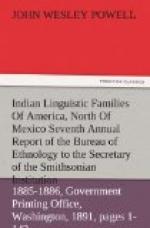For instance, the distribution of game among the families of a party was variously provided for in different tribes, but the practical effect of the several customs relating thereto was the sharing of the supply. The hungry Indian had but to ask to receive and this no matter how small the supply, or how dark the future prospect. It was not only his privilege to ask, it was his right to demand. Undoubtedly what was originally a right, conferred by kinship connections, ultimately assumed broader proportions, and finally passed into the exercise of an almost indiscriminate hospitality. By reason of this custom, the poor hunter was virtually placed upon equality with the expert one, the lazy with the industrious, the improvident with the more provident. Stories of Indian life abound with instances of individual families or parties being called upon by those less fortunate or provident to share their supplies.
The effect of such a system, admirable as it was in many particulars, practically placed a premium upon idleness. Under such communal rights and privileges a potent spur to industry and thrift is wanting.
There is an obverse side to this problem, which a long and intimate acquaintance with the Indians in their villages has forced upon the writer. The communal ownership of food and the great hospitality practiced by the Indian have had a very much greater influence upon his character than that indicated in the foregoing remarks. The peculiar institutions prevailing in this respect gave to each tribe or clan a profound interest in the skill, ability and industry of each member. He was the most valuable person in the community who supplied it with the most of its necessities. For this reason the successful hunter or fisherman was always held in high honor, and the woman, who gathered great store of seeds, fruits, or roots, or who cultivated a good corn-field, was one who commanded the respect and received the highest approbation of the people. The simple and rude ethics of a tribal people are very important to them, the more so because of their communal institutions; and everywhere throughout the tribes of the United States it is discovered that their rules of conduct were deeply implanted in the minds of the people. An organized system of teaching is always found, as it is the duty of certain officers of the clan to instruct the young in all the industries necessary to their rude life, and simple maxims of industry abound among the tribes and are enforced in diverse and interesting ways. The power of the elder men in the clan over its young members is always very great, and the training of the youth is constant and rigid. Besides this, a moral sentiment exists in favor of primitive virtues which is very effective in molding character. This may be illustrated in two ways.




